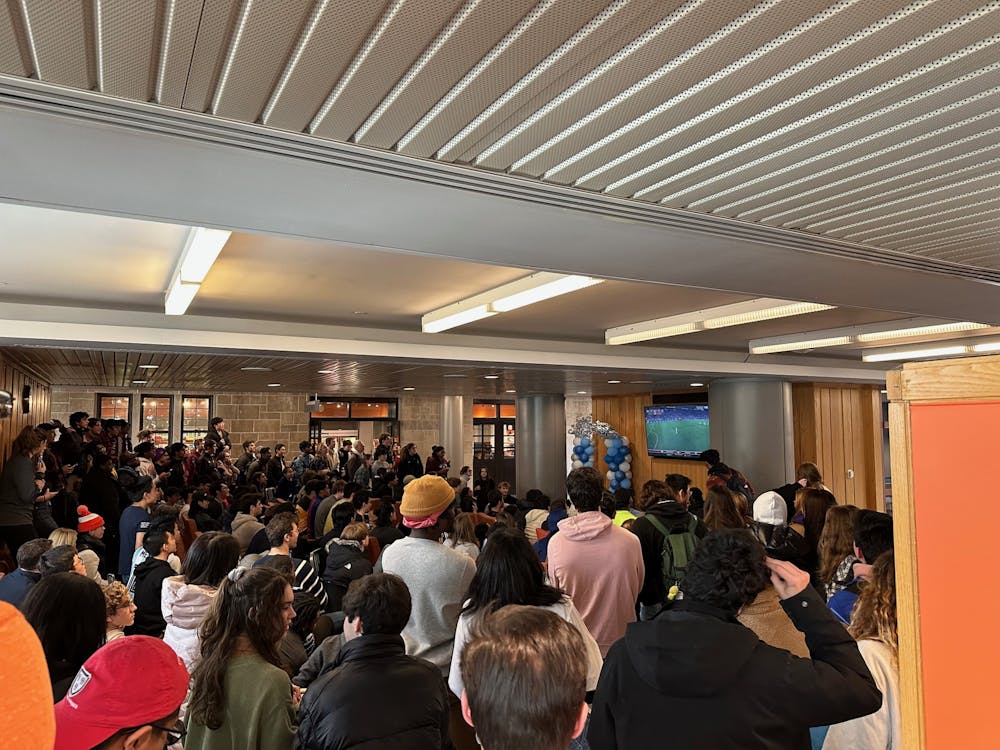Sunday, Dec. 18 marked the close of the FIFA 2022 World Cup, with Argentina taking the victory over France in a penalty shoot-out at the end of a nail-biting final. The excitement was felt all throughout campus, as cheers could be heard from dorm rooms, dining halls, organized watch parties in lecture halls, and Frist Campus Center, where many gathered throughout the tournament to watch with fellow Princetonians.
Watch parties held by cultural and fan clubs like the French and Francophone Society, the Brazil Society, the Messi Club, and many others brought students together to watch their favorite teams play.
Ian Fridman ’25, one of the organizers for the Messi Club’s watch party in East Pyne 010 during the quarterfinal match between the Netherlands and Argentina, spoke to The Daily Princetonian about the cultural importance of celebrating the World Cup on campus.
“Princeton’s diverse, multinational campus is an incredible place to watch the World Cup from. You see, folks from all across the globe come to root for their country,” he said.
The nature of the final was fitting for a World Cup full of historic moments: stunning underdog victories, Morocco becoming the first African team to qualify for a semifinal, and what may have been the last World Cup for some of the most recognizable faces in soccer, such as Lionel Messi and Cristiano Ronaldo.
In the days leading up to the final game, the ‘Prince’ spoke to students at Frist about the impact the World Cup has had on the community here at Princeton.
Sully Atkin ’26, a member of the men’s varsity soccer team, described it as a unifying factor, saying, “It brings a bunch of different groups together to watch one thing. Groups that don’t normally talk, when they come here they have one thing they all share.”
Gil Joseph ’25 expressed a similar sentiment, saying, “It’s a really nice environment when you see students, staff, and professors all together.”

Keletso Rosenberg ’26 mentioned his awe at the “comradery” in Frist during the final game.
“I’ve never seen so many sit down at an unorganized event on campus and just enjoy 90 minutes of visual recreation, so I’ve really enjoyed it so far,” he said.
Fridman explained that the Messi Club is “just some fútbol fans who want to share the Argentinian passion across the [campus] community.”
“We’ve brought people from so many backgrounds to come support the beauty of the sport and this very special competition,” he added. “Fútbol is the single most unifying political and social element in Argentinian society.”

He also explained that the World Cup is a “heavenly cure that comes to heal the gap amongst citizens,” saying that it allows people, regardless of socioeconomic status, region, or political views, to come together and celebrate.
“In a time of great economic crisis and corruption in our country, the high spirit of Argentinians toward fútbol and the World Cup has reminded our people that we all belong to the same team,” he said.
Rosenberg, who is from South Africa, commented on Morocco’s historic run to the semifinal and what their success in this year’s World Cup meant to him as an African.
“As someone who comes from the continent of Africa, there is a certain pride that comes along with seeing African teams qualify, especially given the history, so there is a sort of collective unit that begins to mold on the virtue of being an African,” he said.
The 2022 FIFA World Cup is one to remember for more reasons than the games themselves. Hosted in Qatar, the event drew much attention on social media and the news in relation to current global issues. From German players covering their mouths in protest of the rainbow armband, a symbol of LGBTQ+ pride, to 6,500 migrant workers dying in Qatar since the World Cup was awarded to the county, to a ban enforced by Qatar on Iranian players refusing to sing the national anthem in support of the nationwide protest against the Iranian morality police, the only thing that could have overshadowed the game at this World Cup were the social issues brought to the world stage with it.
Joseph said that where there is talk of “fútbol,” there is always talk of social issues.
“I hear a lot of people talk about the social movements going on, especially at the beginning [of the World Cup],” he said. “Personally, I think it is a great platform to advocate for social movements, but it should happen while maintaining the integrity of the World Cup.”
Rosenberg also voiced his support, saying, “I’m ecstatic that people are sticking it to their regimes by flexing their self-expression.”
With finals week kicking off on Saturday, Dec. 17, students said the World Cup final served as a welcome break from the stress of many students and served as a reminder of what it means to be a community here at the University.
“The World Cup is a refreshing sense of fun. I think for a lot of people it has alleviated stress and given people something to look forward to,” Rosenberg said.
Bridget O’Neill is a news contributor for the ‘Prince.’ Please send any corrections to corrections[at]dailyprincetonian.com.








